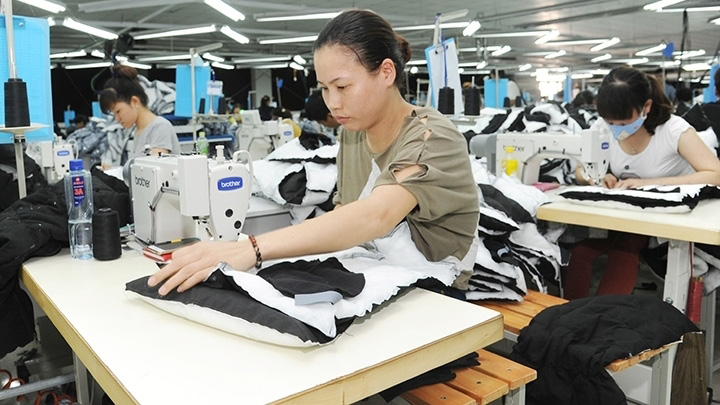



A sewing factory of Bac Giang Garment JSC in Bac Giang city (Photo: Tran Giang)
Economists said that 2017 marked the first year that Vietnam's export revenue hit US$214 billion and the export revenue in 2018 is anticipated to remain high due to the implementation of international economic commitments which will help to reduce export taxes.
In addition, the efforts of the Government, ministries and localities to reform administrative procedures and create a favourable business environment will also contribute to facilitating domestic production and business activities, thus, creating momentum for exports.
However, Vietnam is still encountering a number of problems, causing difficulties to export activities. Economist Pham Chi Lan said that Vietnam has successfully integrated into many global value chains, but has mainly engaged in industrial production activities in the final stage with low added value and weak links between domestic enterprises.
In particular, Vietnamese imports and exports mainly depend on FDI enterprises (accounting for over 70% of total import-export turnover), while the participation of domestic enterprises in import-export activities remains insignificant with a lack of qualified enterprises to join value chains.
Vietnam has to make its choice between continuing exports, with the focus on outwork and assembly with low added values, and diversifying itself to join global value chains to gain higher added value.
According to experts, in order to increase the product value chain for sustainable export growth, Vietnam must develop a comprehensive reform package concerning specific sectors, which must be implemented under a comprehensive roadmap. In addition, enterprises need to enhance their flexibility and ability to grasp market opportunities, while actively improving their skills and management capacity toward higher productivity and effective innovations.
Deputy Head of the Department of Export and Import under the Ministry of Industry and Trade, Tran Thanh Hai, said that there should be more comprehensive solutions toward sustainable exports including promoting production, creating high quality sources of input for exports, enhancing the added value of products, while continuing negotiations on opening markets and strengthening measures to maintain stable export markets.
Hai noted that it is also necessary to complete the legal framework on export activities and build appropriate product chains to increase values for export goods.
In order to create a legal framework for sustainable export, the Prime Minister approved the project on enhancing the competitiveness of Vietnamese export commodities by 2020, with a vision to 2030. One of the main solutions outlined in the project is to re-organise domestic production through the transformation of production and export methods.